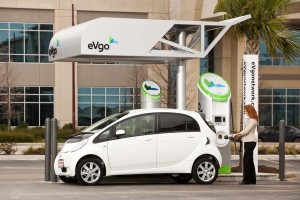Buy a qualifying battery-electric vehicle and you’ll be up for a $7,500 federal tax credit. You’ll also be in line for additional incentives from California, Colorado and nearly a dozen other states and local communities.
If anything, the Obama Administration and several other states would like to add even more incentives aimed at convincing skeptical motorists to trade in conventional, gas-powered vehicles for highly efficient electric vehicles.
But don’t put Washington State on that list. Despite progressive policies on a number of other environmental issues, Washington has enacted a new $100 surcharge on pure battery-electric vehicles – think Nissan Leaf and Ford Focus Electric, but not the Chevrolet Volt or Fisker Karma.
The additional fee is due when a new BEV capable of speeds above 35 mph is registered in Washington and it’s meant to offset the loss of gasoline taxes, Washington officials explain, helping to “mitigate the impact of vehicles on state roads and highways.”
Washington is the first state to actually enact such a surcharge though others, including neighboring Oregon, have studied similar proposals.
According to a study by the Center for Automotive Research, the auto industry currently generates about $135 billion in annual taxes in the U.S., including 13% of all state tax revenue. Notably, the federal government takes in $29 billion from fuel taxes, while $60 billion goes to the states from a combination of fuel taxes, licensing and registration fees.
The typical American motorist getting a combined 25 mpg today pays just under 2 cents a mile in fuel excise taxes – which vary widely by state. Considering the average motorist clocks 12,000 to 15,000 miles annually, that is a source of several $100 normally devoted to road repairs and related purposes.
Battery car proponents recognize that EVs don’t contribute their share towards road maintenance “but it seems ridiculous from a policy standpoint,” Jay Friedland, legislative director for Plug In America, told the Associated Press, calling the new fee “not (a) well-balanced policy.”
But even though the number of battery vehicles on the road may be miniscule, backers of the measure insist that in times of serious state budget shortfalls everyone should be paying a fair share.
Longer-term, if battery-based vehicles start to become a more significant part of the U.S. motor vehicle fleet, proponents acknowledge subsidies will likely go away and owners will almost certainly be asked to cover their costs for things like road maintenance.
“It is an issue we will have to deal with,” Mary D. Nichols, chairman of the California Air Resources Board, acknowledged in an interview with TheDetroitBureau.com. CARB has, until now, been a strong proponent of incentivizing low-emissions and high-mileage vehicles.
Adding a $100 fee would work out to less than a penny a mile for the average U.S. motorist – though EV owners tend to clock lower mileage than those operating conventionally powered vehicles. Considering it costs only two to three cents a mile to charge a battery car that’s a significant premium. But when balanced against the 10 to 15 cents a mile for comparably sized gas vehicles it’s easier to dismiss the Washington premium.
Nonetheless, automakers are concerned that the slight penalty might further discourage sales of battery vehicles which have already lagged initially modest expectations.
The Washington State battery car registration fee, meanwhile, could test the waters for other changes in the way states raise roadway revenues. Oregon, in particular, has been studying a per-mile charge that would replace gas taxes. Privacy advocates worry about the potential implications of tracking motorists’ movements.
But as higher-mileage vehicles and those that use no gasoline at all expand their presence on the road lawmakers may be forced to scramble to find tax alternatives.


Obama is fleecing tax payers and the car companies are helping by charging other auto consumers a premium to pay for the impractical EVs that the Obama administration is forcing on America. Those who buy EV’s not only get tax payers to subsidize their purchase, they do not pay their fair share for road use via state and federal gasoline taxes.
In addition states and municipalities will be spending billions on EV charging infrastructures to support EVs that will be obsolete and gone in 10 years. This is the fleecing of America on a grand scale.